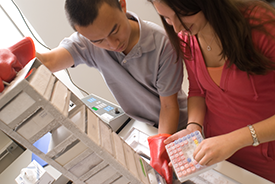NSF funds graduate school pathway for bio majors
TCNJ’s “Gateway to Graduate School” program will fund two cohorts of 10 students through four years of intensive research and mentoring from biology faculty.

 Jennifer Aleman ’14 wanted to study biology in college because she loves the extensive lab and research work the discipline requires. So when Aleman was accepted into TCNJ’s “Gateway to Graduate School” program, she was especially excited. The program is allowing her to spend her freshman year performing month-long mini-rotations through faculty-student research labs in environmental and model-organism biology.
Jennifer Aleman ’14 wanted to study biology in college because she loves the extensive lab and research work the discipline requires. So when Aleman was accepted into TCNJ’s “Gateway to Graduate School” program, she was especially excited. The program is allowing her to spend her freshman year performing month-long mini-rotations through faculty-student research labs in environmental and model-organism biology.
“This program has provided me with such a great opportunity, one that is not available at many colleges or universities,” said Aleman. “I was involved in research early on—essentially in my first month at TCNJ.”
“Gateway to Graduate School” is a new program in the School of Science. Funded by a five-year, $644,370 grant from the National Science Foundation (NSF), the program is designed to support and motivate students from groups historically underrepresented in the biological sciences and to prepare them for graduate school in biology.
NSF “wants more people becoming scientists in the country, and in particular [it wants to] diversify the people who become scientists,” said Janet A. Morrison, associate professor of biology. Morrison is also TCNJ’s director of faculty-student collaborative activity and submitted the grant proposal to NSF.
“Our [program] is targeted toward groups [that] are underrepresented in the biology sciences,” she explained.
TCNJ’s “Gateway” program will fund two cohorts of 10 students through four years of intensive research and mentoring from biology faculty. The first group of students was admitted to the program in fall 2010, and the second will enter in fall 2011. During the students’ freshmen year, they take part in the month-long lab rotations, during which they are teamed up with older students and exposed to different techniques and ideas. The freshmen must complete three rotations in environmental biology labs, and three rotations in cell molecular biology labs, to “get a wide range of experiences,” said Morrison.
In their sophomore year, the “Gateway” students will pick a field of study to focus on and complete a three-year research project. Along the way, they’re provided with funds for research supplies, travel to professional conferences and networking events, Graduate Record Exam preparation, and various workshops, among other things. They will also receive $18,800 in stipend support during their junior and senior years and be guaranteed a spot in TCNJ’s Mentored Undergraduate Summer Experience (MUSE).
Although it’s still too early to gauge the program’s success in increasing the number of underrepresented groups applying to biology graduate programs, early indications are that the lab rotations have been particularly helpful for the program’s first group of freshmen.
Robert Myers ’14, who said he had planned on majoring in biology since his freshman year of high school, said the rotations have given him a better grasp of the different fields of biological research available to pursue, and have also helped him meet people in the department.
“‘Shadowing’ different labs has allowed me to make connections both with upperclassmen and with professors, who are all invaluable sources of information and advice,” said Myers.
Maya Williams ’14 said she’s interested in so many different fields of study that it’s been hard to pick just one on which to focus. “The rotation is perfect for me, because I can dabble in everything,” Williams said.
Morrison, who is working closely with the freshmen, is excited to see the work that these students complete over the next four years.
“They should be able to complete a really interesting project and to put themselves out there as being prepared for graduate school,” Morrison said.
Posted on February 23, 2011

